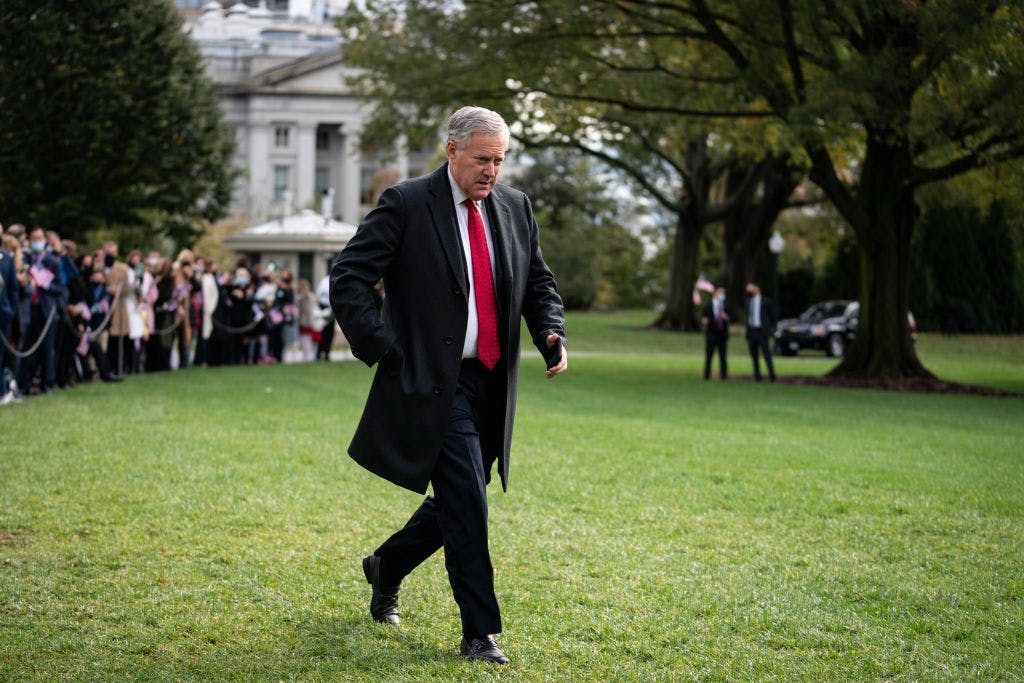Fani Willis, in Her Zeal To Convict Trump, Could Soon Find Her Case Before the Supreme Court, Alongside Jack Smith’s
An appeal from the 45th president’s chief of staff could offer another opportunity for the justices to take constitutional stock.

Just as the Supreme Court docket appears saturated with matters relating to President Trump — this paper calls it “The Trump Docket” — a Georgia case concerning the 45th president’s aide-de-camp could be rounding the high court’s bend.
Chief of Staff Mark Meadows’s petition that the full bench of the United States Court of Appeals for the 11th Circuit decide where his criminal case will be heard catapults the racketeering charges brought by the district attorney of Fulton County, Fani Willis, one step closer to the Nine.
Mr. Meadows is a criminal defendant alongside his erstwhile boss, Mr. Trump, in the sprawling case brought by Ms. Willis. She alleges a criminal conspiracy to overturn the 2020 election. Mr. Meadows argues that his former position and the nature of his service to Mr. Trump mean that his trial belongs in a federal court, not a state one.
Federal officials often prefer the confines of the federal courts. They are less familiar terrain for state prosecutors and draw from a wider jury pool. Should Mr. Meadows be tried at Fulton County, he will face a jury drawn largely from downtown Atlanta, an area that handed President Biden 72 percent of its vote. The northern district of Georgia, where a federal jury would be based, comprises conservative counties.
That position was lost at the district court. Judge Scott McAfee ruled that Mr. Meadows’s efforts to overturn the 2020 election results in Georgia were not undertaken “under color” of his federal office, as required by law. Shorn of that umbrella, the judge ruled his case belongs at Fulton County. Mr. Meadows also lost before a panel of the United States Court of Appeals for the 11th Circuit.
In a 3-0 opinion, Chief Judge William Pryor wrote, “We cannot rubberstamp Meadows’s legal opinion that the president’s chief of staff has unfettered authority.” He rejected Mr. Meadows’s contention that the chief of staff has a role to play in elections. Now, in addition to his appeal for an en banc hearing, Mr. Meadows can petition the high court for a writ of certiorari immediately or after a final appellate judgment.
That unanimous ruling, though, comprised a concurrence that could attract the attention of some of the justices. It is signed by two of the riders, Robin Rosenbaum and Nancy Abudu — appointees of Presidents Obama and Biden. They warn that state prosecutions like Ms. Willis’s can “cripple government operations, discourage federal officers from faithfully performing their duties and dissuade talented people from entering public service.”
While Judges Rosenbaum and Abudu ultimately decided that the law cuts against Mr. Meadows, their stark language suggests a certain amount of discontent with the hypothesized downstream effects of Ms. Willis’s prosecution of Messrs. Trump and Meadows. Those misgivings could surface as dissents in an en banc hearing, or be picked up in a possible ruling before the high court.
This is grist for Mr. Meadows’s mill, but it is also music to Mr. Trump’s ears. While the 45th president has not filed a removal request himself, he could be waiting to see how Mr. Meadows’s is resolved. His case for broad-based presidential immunity also shares logic with the rationale for removal — both immunity and removal have their roots in the worry that state prosecution can impede the functioning of the federal government.
Mr. Trump’s immunity case is currently before another appellate court, the United States Court of Appeals for the District of Columbia Circuit. The Supreme Court declined to hear a petition for expedition from Special Counsel Jack Smith, but it could still hear the question in the regular course. That case, though, relates exclusively to the office of the president.
Mr. Meadows’s request for removal has more far-reaching implications because its disposition would affect not only the president but every former federal officer who is charged in state court for actions undertaken while working for America. At stake is not only the fate of Mr. Meadows but the reach of the Supremacy Clause, which ordains that the Constitution, federal law, and treaties all trump state law.

